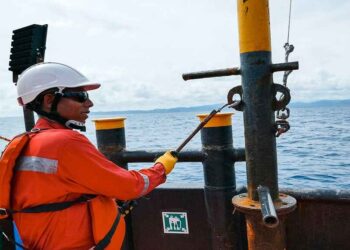Russia hosts vast offshore oil and gas resources, estimated to be up to 100 billion mt of oil equivalent. But Western sanctions, a lower oil price and a lack of technological capabilities are stalling development of these resources. Three analysts discuss what the future holds for Russia’s offshore oil and gas industry.
Kara sea
In 2014 Russia’s natural resources minister, Sergei Donskoy, said the country could make discoveries of oil and gas plays “comparable to Saudi Arabia”. These reserves, however, are thought to be in mainly underexplored new frontiers such as the Arctic.
Knowing foreign investment and technologies will be needed to explore for and develop these potential reserves, Russian authorities have made a significant attempt to attract foreign investment by providing a wide range of tax breaks in a bid to make these highly risky projects more attractive.
This has resulted in deals between Russia’s biggest oil producer, Rosneft, and international majors such as ExxonMobil, Statoil and Eni, one of the most significant partnerships being between ExxonMobil and Rosneft to develop oil reserves in the Kara Sea.
However, a lower than expected oil price and sanctions imposed on Russia last year in response to the conflict in Ukraine have stalled these projects. With no sign of the sanctions easing and the oil price only creeping up slowly, Russia faces a dilemma over how it should develop its offshore reserves.
Setbacks and sanctions
One of the first restrictions to developing Russia’s offshore oil and gas industry is Russian legislation that states that only state-run companies are eligible to hold licenses for offshore reserves and any international and Russian private companies need to cooperate with Rosneft and Gazprom if they’re interested in such projects.
The second is international sanctions stopping these partnerships. Under US sanctions, companies aren’t allowed to participate in Russian oil projects, which has resulted in ExxonMobil and Rosneft’s project in the Kara Sea being put back until 2018, according to reports by Reuters.
Andrew Neff, principal analyst at IHS Energy’s petroleum sector risk group says: “Companies are not allowed under the sanctions to participate in projects and the Russians do not have the technological expertise [to do it themselves] and now they do not have the access to financing either, so for longer-term projects the time line is going to be extended even further.
Anti-Arctic: Big Oil loses steam in the High North
As financial strain continues to tighten belts, a number of companies have backed away from exploring oil in the Arctic.
“Russia would need to develop its own technology, which is doable but it is going to take a longer time. Western companies will enable Russia to proceed with these projects in a 10 – 15 year horizon and without that Western investment you are pushing that down another five years at least.”
Both US and European Union (EU) sanctions will restrict Gazprom and Rosneft’s access to world-leading offshore technology suppliers such Schlumberger and Halliburton.
EU sanctions, however, have been less stringent than those levied by the US, providing Russia with a lifeline to Western expertise and money.
“EU sanctions still allow companies with pre-existing contracts to continue operation,” says, Dr Wei Liu from Infield Systems, a leading consulting and advisory company for the offshore oil and gas industry.
“This has led to expanded activities in Russia from European international oil companies such as BP, Eni, Shell and Statoil.”
According to a recent article in the Financial Times some major European companies have extended deals with Russia. For example, the paper reports that BP is thought to be close to agreeing a deal to acquire a 20% stake in a Siberian oilfield with Rosneft, and Italy’s Eni and Statoil of Norway have received approval to continue work with their joint ventures with Rosneft.
Liu says at the moment Russian oil production has been largely unaffected by the sanctions, with oil production up 0.6% to 10.8mbpd in 2014 compared to the year prior – this is compared to a 15% reductionin Iranian oil production in 2012, the year sanctions were imposed on the country.
However, with Russia’s oil production largely based on enhanced production from brown fields inherited from the Soviet Union, without further large-scale investment in unconventional and offshore projects, production will likely fall by the end of the decade.
Will foreign investment abandon Russia?
Major international oil companies have a lot at stake in Russia, with assets ranging from Shell’s gas plant in Sakhalin to BP’s 20% stake in Rosneft. BP is looking to expand its business in Russia by acquiring an $800m stake in an east Siberian oilfield from Rosneft, says Liu. Shell has announced plans to boost capacity of the $20bn Sakhalin plant by a third, while Total is pursuing ways to unlock investments into the $30bn Yamal gas facility.
“Foreign investment is attracted by Russia’s huge potential in oil and gas but, at the same time, is pulled away by the country’s political uncertainty, high tax burden and lack of transparency,” says Liu.
“Foreign investment is attracted by Russia’s huge potential in oil and gas but, at the same time, is pulled away by the country’s political uncertainty.”
“Both political and business conditions need to improve to attract adequate investment from the oil majors to develop its unconventional resources.”
Neff thinks Western companies are going to start looking elsewhere: “Given the geopolitical situation it strikes me that Western companies are going to look elsewhere in the short term and in the long term want to see some cohesion,” says Neff.
“There is, however, in one respect the implicit argument that if you abandon Russia at the moment then the Russians are going to hold it against you for the future. They’re trying to keep things as they are without putting new money into projects.”
Liu points out that, although Russia hasn’t fully complied with peace agreements, the political environment in Russia has recently calmed down and while last year many CEOs of major western oil companies pulled out of the St. Petersburg International Economic Forum, this year the heads of BP, Shell and Total are all attending the investment show in late June.
Alternative finance
If new Western finance is off limits, the other obvious place for Russia to turn would be China, but Neff says China is not a complete financing solution for Russian companies.
“The expectation we have seen in the last five years, maybe up until last year, is that Chinese companies had lots of money and were willing to spend money for access to resources,” says Neff.
“However, Russians have been very hesitant to allow upstream equity access for Chinese companies, and where they are now being more open towards that idea we are also seeing the Chinese companies themselves pulling back; the Chinese economy isn’t rolling the same way as it had been and there is a greater scrutiny of Chinese oil companies’ investment plans. Also the Chinese don’t have the right technology to help the Russians in the way they need for offshore projects.”
Offshore Cuba – can Russia succeed where others have failed?
Russia has pledged to plough money into developing Cuba’s offshore oil, despite many having tried and failed before.
“Another source of finance,” say Liu, “comes from smaller private E&P companies in Russia. Last year, small independent oil companies made significant investment and increased their production by 11% to just over 1mbpd.”
But even if Russia could find alternative funding, the current low oil price is going to make new frontier projects – particularly in the Arctic – less financially viable says Nadia Rodova, Moscow managing editor at leading global energy and commodities information provider Platts.
“Ecological risks are extremely high as consequences of oil spills in the Arctic could be catastrophic, much more serious than those in the Gulf of Mexico. In addition, the experience of rescue operations in such waters are highly limited globally,” says Rodova.
“All those challenges make such projects highly risky and expensive, so their economic viability remained questionable even under the last-year high prices of around $100/b. At current prices of around $60/b, the attractiveness of such projects is questionable.”
Rodiva points out that although Gazprom Neft’s officials have recently commented that their Prirazlomnoye project would be cost-efficient even at lower prices, but the key investments have been already made into it. Prirazlomnoye is currently the only producing crude project in the Arctic Pechora Sea, with commercial output starting last year.
Liu agrees that Russia will need a higher oil price to make these investments, as they will be more costly.
“Russia is essentially in the situation where it is going to need higher oil prices to justify the cost of investing in fields that are going to be more costly to produce in the first place.”
However, despite the short term prospects for Russia looking very uncertain, Liu says Russia’s long-term prospects remain promising due to the potential of its undeveloped reserves.
Over the coming decade Russia, Saudi Arabia and the US will remain the largest oil producers in the world with more than 10mbpd of production each. Russia’s natural gas production will be the second largest in the world, second only to the US.

















































